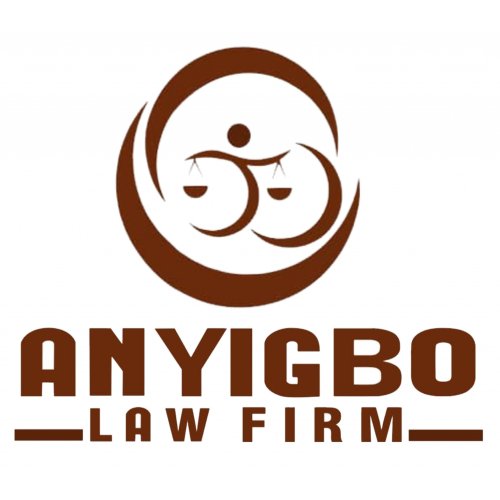Best Child Visitation Lawyers in Onitsha
Share your needs with us, get contacted by law firms.
Free. Takes 2 min.
Free Guide to Hiring a Family Lawyer
List of the best lawyers in Onitsha, Nigeria
About Child Visitation Law in Onitsha, Nigeria
Child visitation law in Onitsha, Nigeria governs the rights and responsibilities of parents or guardians when it comes to spending time with their children. It focuses on ensuring the best interests of the child while considering the rights of both parents. Child visitation arrangements are typically made between divorced or separated couples to facilitate regular contact between the non-custodial parent and the child.
Why You May Need a Lawyer
There are various situations in which you may need a lawyer to assist you with child visitation matters in Onitsha, Nigeria. Some common examples include:
- Disputes between parents regarding visitation schedules
- Issues arising from non-compliance with visitation agreements
- Modification of existing visitation orders due to changed circumstances
- Enforcement of visitation rights that have been denied or restricted
- Obtaining visitation rights as a non-custodial parent
Hiring a lawyer can help you navigate the legal process, understand your rights, and ensure the best interests of the child are considered.
Local Laws Overview
The following are key aspects of local laws relevant to child visitation in Onitsha, Nigeria:
- Legal Presumption: There is a legal presumption that regular visitation with both parents is in the best interests of the child, unless there are extenuating circumstances.
- Court Discretion: The court has the discretion to determine visitation schedules based on factors such as the child's age, health, and the parents' ability to provide a suitable environment.
- Mediation: Mediation is encouraged to resolve visitation disputes amicably before proceeding to court, with the aim of reducing conflict and protecting the child's welfare.
- Enforcement: In cases where visitation rights are being denied or restricted, the court has the power to enforce visitation orders and may impose penalties for non-compliance.
Frequently Asked Questions
1. Can grandparents seek visitation rights in Onitsha, Nigeria?
Yes, grandparents can seek visitation rights in Onitsha, Nigeria. However, they must demonstrate that it is in the best interests of the child to have contact with them. The court will consider factors such as the prior relationship with the grandchild and the potential impact on the child's overall well-being.
2. Can visitation rights be modified?
Yes, visitation rights can be modified in Onitsha, Nigeria if there are changed circumstances that warrant it. Examples of changed circumstances may include relocation of a parent, change in work schedules, or the child's age and preferences. An application for modification can be made to the court.
3. Can visitation rights be enforced?
Yes, visitation rights can be enforced in Onitsha, Nigeria. If a parent refuses to comply with visitation orders, the aggrieved party can seek assistance from the court. The court may issue an enforcement order, impose penalties on the non-compliant parent, or modify the visitation arrangements to ensure compliance.
4. What options are available if the custodial parent denies visitation?
If the custodial parent denies visitation in Onitsha, Nigeria, the non-custodial parent can take legal action. It is advisable to engage an attorney who can guide you through the process. The court may intervene, enforce existing visitation orders, or modify them to ensure the child's right to maintain a relationship with both parents.
5. Is mediation a mandatory process in visitation disputes?
Mediation is not mandatory in visitation disputes in Onitsha, Nigeria. However, it is encouraged as an alternative dispute resolution method. Mediation can help parents reach an agreement on visitation arrangements without going to court. This can minimize conflict, save time, and protect the child's best interests.
Additional Resources
- Onitsha High Court: The Onitsha High Court can provide information and assistance on child visitation matters within its jurisdiction.
- Nigerian Human Rights Commission: The Nigerian Human Rights Commission offers guidance on human rights, including child visitation rights.
- Legal Aid Council: The Legal Aid Council may provide free or affordable legal services to individuals who cannot afford private legal representation.
- Nigerian Bar Association: The Nigerian Bar Association can provide referrals to experienced family law attorneys who specialize in child visitation cases.
Next Steps
If you need legal assistance regarding child visitation in Onitsha, Nigeria, consider taking the following steps:
- Gather all relevant documents related to visitation arrangements, court orders, or any evidence of denial or restriction of visitation rights.
- Research and contact reputable family law attorneys who have experience in child visitation cases.
- Schedule consultations with potential attorneys to discuss your situation and understand their fees, expertise, and approach.
- Select an attorney who best fits your needs and budget, and engage their services.
- Follow your attorney's guidance, provide them with all necessary information, and cooperate throughout the legal process.
- Attend court hearings and mediations as required, and communicate openly with your attorney to achieve the best possible outcome.
Lawzana helps you find the best lawyers and law firms in Onitsha through a curated and pre-screened list of qualified legal professionals. Our platform offers rankings and detailed profiles of attorneys and law firms, allowing you to compare based on practice areas, including Child Visitation, experience, and client feedback.
Each profile includes a description of the firm's areas of practice, client reviews, team members and partners, year of establishment, spoken languages, office locations, contact information, social media presence, and any published articles or resources. Most firms on our platform speak English and are experienced in both local and international legal matters.
Get a quote from top-rated law firms in Onitsha, Nigeria — quickly, securely, and without unnecessary hassle.
Disclaimer:
The information provided on this page is for general informational purposes only and does not constitute legal advice. While we strive to ensure the accuracy and relevance of the content, legal information may change over time, and interpretations of the law can vary. You should always consult with a qualified legal professional for advice specific to your situation.
We disclaim all liability for actions taken or not taken based on the content of this page. If you believe any information is incorrect or outdated, please contact us, and we will review and update it where appropriate.











